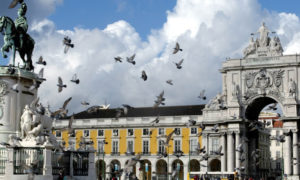(Editor’s note: This is Pt. 2 of a two-part series comparing flying, which has a huge carbon footprint, with less polluting modes of public transportation. Joanna Storie believes we have to change how we live for the sake of our children and is actually doing something about it, in this case changing the way she travels. You can see Pt. 1 here. )
My Finnish trip was a good preparation for the big test, travelling from my village about 100 kilometers east of Riga, Latvia to Hannover in Germany via Lithuania and Poland, a journey of about 1,600 kilometers.

I was travelling for work to a conference. I technically work from home, so I have the flexibility to decide how I travel.
I am trying to avoid flying and testing how feasible that actually is. I was wondering how I would cope with an overnight bus ride – especially at my age – and how much longer I needed to factor in the slow route. I would like to try this more often and look forward to more overnight trains being available, but that is not feasible at the moment as there is no direct train between Riga and Warsaw.
From Warsaw, the connections are better to Europe.
So I was headed to Hannover. The internal German bus was Flixbus, and the international leg was Ecolines.
I try whenever possible to take our local bus into Riga rather than have my husband drive me in as it saves fuel and money. So, I took the afternoon bus into Riga and the overnight bus to Berlin. I arrived in time to have lunch with a friend, so I was not rushing to get to my destination.
I was in Hannover by 8 p.m. one day later.
Buses have pluses, but also downsides
So, what’s it like to do such a journey? I’m used to bus journeys and long days of travel. I regularly travel up to my university by public transport and door to door that’s about 10 hours with a long overlay in the middle. It would only take 3.5 hours by car but cost significantly more. Long layovers between transfers can be an issue but also a chance to stretch your legs or meet up with friends.
Upsides of taking the bus include:
• I’ve learnt to sleep on buses. I’ve learnt to work on buses. I’ve learnt to let my mind wander while gazing out over fields and forests – and there are plenty of those up north.
I’m often “reading” the landscape too, looking for clues as to the type of agriculture, land management, history, biodiversity and so on. It enriches the travel experience and something that is more difficult to do up in the air or when driving a car.
• In fact, I highly recommend not sleeping, and working or letting your mind wander while driving. Along the way I’ve seen moose, deer, foxes, rabbits and hares as well as a huge variety of domestic livestock from the trains and buses that I’ve travelled on.
• I also people watch, which is a fascinating exercise in itself.
• There is more room on buses than airplanes.
• There are plug sockets on the international buses and USB ports on the national buses in Germany, so it is not a problem to work or to ensure the phone is charged by the time you get to a destination, a plus over planes.
• A middle of the night text to cancel the train to Hannover was not appreciated but at least I could re-book for the bus; it just meant leaving earlier. Cancellation of plane flights is usually more problematic.
The downsides:
• Although there is more room on the buses than on planes – and so laying a seat back is acceptable – not all of them are comfortable, and some are better than others. If the footrest is not working, my legs suffer.
• Wifi is slow on most buses and trains (even my local rural bus has Wifi).
• On some buses there are free drinks, but I have known them to run out, which was not great.
• Grumpy drivers but nice attendants are some of the other delights.
• Night-time passport checks on the Polish border were not my idea of fun, but that was only one way. I wonder if they reserve that delight for the night-time buses?
My top tips for travelling long distances are to make sure you have plenty of food and enough water; it passes the time if nothing else. Also take a neck pillow. I don’t normally bother on planes, but the longer time spent on the bus means it is better to learn to sleep while travelling, or at least doze.
If I wasn’t working so much these days, I would also take a book reader as that is easier to read on a bus than a book when it gets dim and you can take more to read without adding too much weight. I see many people playing games on these devices, which is another way of passing the time I guess, but not for me.
Would I do it again. Yes! I would. I think it is more interesting and to be honest much of the public transport travel in Europe is good.

No queuing at airport security and not having to arrive hours before a flight are bonuses.
About the author:
Joanna Storie is a British emigrant and Ph.D. candidate living in Latvia.
You can read all of Joanna’s posts here.




























